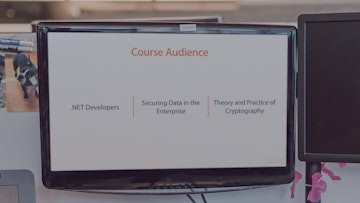
Good to know
Save this course
Activities
Career center
Cryptography Engineer
Security Consultant
Security Researcher
Information Security Analyst
Cybersecurity Analyst
IT Security Analyst
Security Engineer
Security Architect
Network Engineer
Software Engineer
Systems Engineer
Cloud Engineer
DevOps Engineer
Data Scientist
Machine Learning Engineer
Reading list
Share
Similar courses
OpenCourser helps millions of learners each year. People visit us to learn workspace skills, ace their exams, and nurture their curiosity.
Our extensive catalog contains over 50,000 courses and twice as many books. Browse by search, by topic, or even by career interests. We'll match you to the right resources quickly.
Find this site helpful? Tell a friend about us.
We're supported by our community of learners. When you purchase or subscribe to courses and programs or purchase books, we may earn a commission from our partners.
Your purchases help us maintain our catalog and keep our servers humming without ads.
Thank you for supporting OpenCourser.


